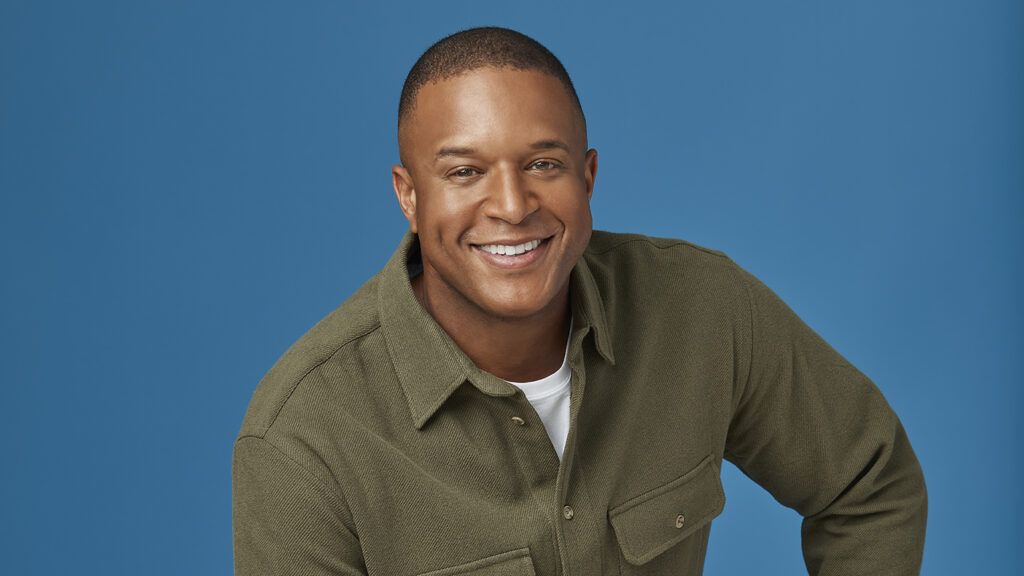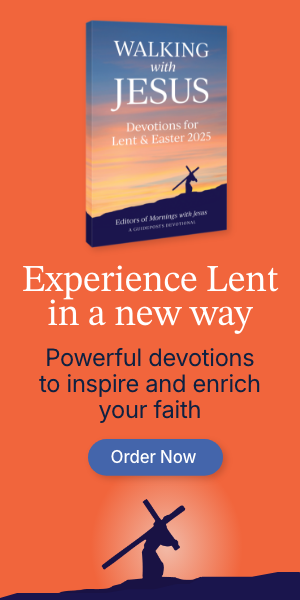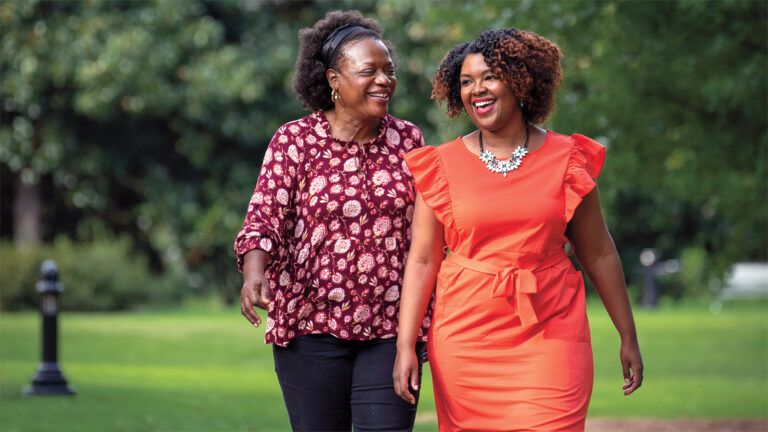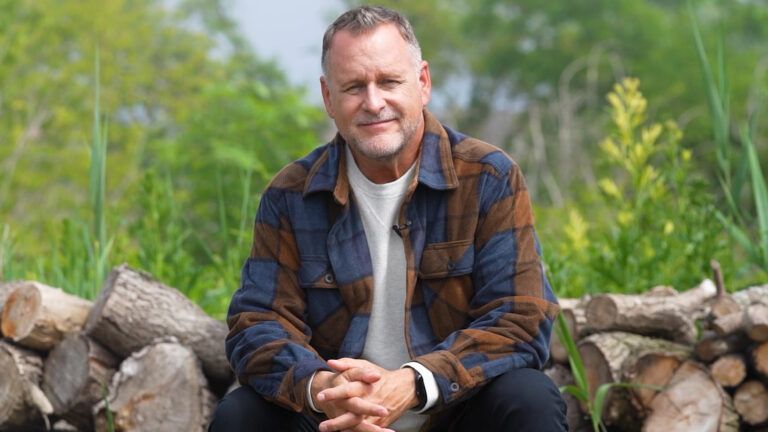My dad—Pops—was in alcohol rehab. He’d been there for eight weeks, down in southern Georgia. I would be his first visitor, and I was nervous. I didn’t know what to expect, mainly because I could hardly remember ever seeing my dad sober.

issue of Guideposts
On the flight down and then the drive from the airport, my anxiety only grew. I hadn’t spoken to him since he’d been admitted. No one had. I’d written him a couple letters, mostly keeping things light. Of course, Pops and I very rarely held conversations that were anything but surface. We didn’t talk much at all. What would I say to him now?
We’d done the intervention on a Sunday morning at my brother Ryan’s house in Columbia, South Carolina. It was Mom, Ryan, our cousin Kevin and the therapist we’d worked with. She had told Mom to have Pops’s bag all packed and ready to go. Ryan had offered some pretext on why my dad needed to come over—to help fix a door. Pops prided himself on being handy, even when he was loaded. Ryan went to pick him up.
Eleven o’clock in the morning, Pops was already drunk and disheveled. The minute he ambled in the door and saw us sitting there, an older white lady—the therapist—in our midst, he knew something was up. I could see it in his eyes. Pain, understanding, defiance, surrender. I couldn’t tell which. Maybe it was all of those things at once.
I’ve heard that every alcoholic comes to the point where they know the jig is up, whether they’re ready to admit it or not. After years of struggle, I’ve come to accept that alcoholism is a disease—more important, a family disease. Pops’s dad, a “wino” as Pops referred to him, lived in squalor to the end, drinking himself to death. Mom’s father was an abusive alcoholic.
Pops did a lot to make something of himself, serving in the Air Force, then working for the post office for 40 years, the graveyard shift and any other hours he could pick up. The man was a tireless worker, drunk or sober, and had only recently retired.
His most precious possession was a 1973 Pontiac LeMans. That car broke down so many times, I’d be drafted to help him, huddled under the hood, holding a flashlight, handing him a socket wrench. All the while, Pops would barely say a word.
It was hard for my dad to connect with people. Maybe that’s why he gave himself the excuse of a six-pack. To lubricate a conversation. After work, he would spend hours at a place that Mom used to call the Cut. Not a club or a bar but someone’s backyard—literally a cut behind a few houses.
He and his pals would hang out, drinking, smoking cigarettes, shooting craps and talking. Maybe Pops was just all talked out by the time he made it home. He was definitely ready for bed.
My friends called him “the ghost” because he was never around. At 10 or 11 years old, playing second base in Little League, I summoned the courage one night to tell him that it would be nice if he could show up for a game. The next day, I came up to bat and gazed down the left-field line. There was Pops, watching me. Pleased as a boy is to see his dad in the stands, it also unsettled me. Did he really want to be there?
For the intervention, we’d written letters and read them aloud, telling stories like that, saying how much he mattered to us and what his alcoholism had stolen from us.
Kevin talked about his late mom, Dad’s beloved sister, and how disappointed she’d be to see her brother like this. I described how much my wife, Lindsay, and I wanted our kids to have a real grandfather, the kind that alcoholism had robbed me of. Mom’s letter was all about wanting her husband back. I heard her say heartbreaking things she’d never said before. Not in front of any of us.
Pops just sat there. And then he started crying.
There’s something unnerving for a son to see his father cry. This is true at any age, maybe a response to the taboo against men displaying emotion. The one time I’d seen Pops break down was at his mother’s funeral. She’d been hit hard with Alzheimer’s; the first time I noticed was at a Sunday dinner when she tried to pry open the microwave with a butter knife.
Her decline and loss escalated his drinking. Like many men of his generation, Pops hid his feelings rather than reveal them and appear weak. Watching him cry now, I understood that alcohol was a way for him to wall off those emotions—fear, anger, hurt.
We finished reading our letters. The therapist gently told my dad that there was a place he could get help about two hours away and that Kevin was ready to drive him there. I fully expected Pops to say, “Hell, no. Screw this.” Or he’d make some vague promise to change on his own. Instead, he got up, hugged us and then said, “Let’s go.” I was nonplussed.
Pops was 67 years old. This was the most courageous thing he’d ever done.
Decades before, in the 1990s, another addiction loomed: gambling. Video poker machines had popped up all over. On payday, Pops would cash his check, then drop by Tom’s Party Shop—the closest liquor store—and squander every cent. That put a lot of pressure on Mom financially. She was a schoolteacher. Together they’d saved enough to buy a house in a good neighborhood and eventually send me to college. Now the pressure was killing her.
Sometimes Ryan and I would join Mom in the car, and she’d drive over to Tom’s, where she’d try to stanch the flow. Once she sent me inside too. There was Pops, slouched in front of a slot machine, tapping the buttons with one hand, a cigarette in the other, a trusty Budweiser at his side.
I swore I’d never be like him. I searched everywhere for role models. Other father figures. It never occurred to me back then that Pops had never had his own role model to look up to, a father who modeled good parental behavior. As I have since learned, alcoholism is a family disease. It afflicts everyone, even through the generations, derailing healthy family dynamics.
Video poker was finally banned in South Carolina in 2000. Pops was able to quit gambling cold turkey, giving us a glimmer of hope that the drinking might follow. Instead, it only got worse. Alcoholism is a progressive disease.
I may have avoided becoming a drinker, but I couldn’t escape the feelings that Pop’s drinking created. The emotional wreckage, the anger and resentment that boiled up inside. It ate at me that he wasn’t around most of the time. Early in my journalistic career, I was supposed to do a live on-camera interview with Pops. He went AWOL. Didn’t show up. Didn’t even call.
That hurt so much. Why couldn’t he get the monkey off his back? Why couldn’t he do something? I found during my early twenties that I had trouble maintaining close relationships. Like many children of alcoholics, I feared intimacy and questioned my self-worth, as if Pops’ drinking had left a hole inside me.
Somehow Mom stuck with him. The first in her family to go to college, she also got a graduate degree. She was incredibly strong, her love stronger than Pops’ alcoholism. There were times she carried our family single-handedly. If I have achieved any degree of professional success, it’s thanks to my Lord and Savior and to Betty Jo Melvin. In that order.
What took me so long to grasp that alcoholism really is a disease? Not just a lack of willpower or self-discipline but a clinical illness.
The turnaround came through a colleague whose stepfather had lost his son to drugs. He’d started a nonprofit helping people help their loved ones overcome addictions. I had lunch with him, and he connected me with another guy. That got the ball rolling.
The more I learned, the more I understood. Becoming a dad helped too. Like I said, I didn’t want my kids to know a grandfather who was always clutching a can of beer. We had to get Pops some help.
I’ve always believed in the power of prayer. I pray all the time—in the dressing room, in the car at night. I think that’s the relationship God wants us to have. This ability to hold a conversation with him, wherever you are. The intervention we did with Pops was one of the hardest things I’d ever done. Saying all of that raw stuff to his face. Now I was praying for Pops to recover.
“God, please, please hear that prayer,” I said over and over as I drove to my dad’s rehab.
Pops and I had agreed to meet in front of the main building. I stepped out of the car and walked over to him, and Pops gave me this huge, beautiful hug. We’d never really been big huggers before, but, man, there it was. I started to cry, and so did he. At that moment, I knew things were going to be different. Rehab was working. Prayer was working.
We went inside and had breakfast, and Pops introduced me to his new friends. He showed me his room. Then he gave me a letter. Sort of his origin story. How his mother—a saintly churchgoing grandmother to me— had given birth to him in a prison. She was serving time for bootlegging, the only way she could think of to make some money to compensate for her husband’s alcoholic incapacity. As I said, a family disease.
I keep that letter in my safe. It’s that valuable. The first letter that Pops had ever written to me in his life. All thanks to rehab.
When my dad got out, we forged a new relationship based on openness, honesty and affection. It isn’t always easy dealing with our emotions. We have long heart-to-heart conversations. He’ll tell me I work too hard. “You don’t want to miss out on the kids’ soccer games,” he’ll say, and I laugh. This guy telling me not to work too hard? Yet it’s as if he’s sharing all the wisdom that got bottled during his drinking years.
One day, Pops mentioned something about one of my broadcasts. “Wait. You watched that?” I asked him, surprised.
“Of course,” he said. “I watch all of your stuff.”
Yeah, sure, I thought. So I asked Mom, and she said it was true. Some days I’m on for four hours. Pops will hang in there for the whole thing.
I thought about that day in Little League when I was so surprised to see my dad in the stands and wondered if he really even wanted to be there. Now I knew. He did.
For more inspiring stories, subscribe to Guideposts magazine.
Craig Melvin is the author of Pops: Learning to be a Son and a Father available wherever books are sold.






